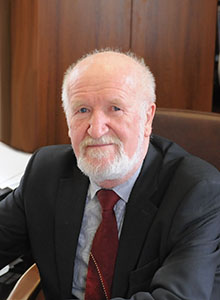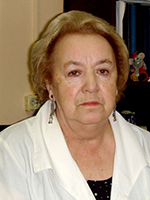
Head of the Laboratory
Denisenko Alexander Dorofeevich, доктор медицинских наук, профессор
e-mail: denisenko.ad@iemspb.ru
Phone: (812) 234-49-07
A brief history of the laboratory
The Laboratory for the Regulation of Lipid metabolism was created in the Biochemistry Department of the RAMS in 1997 on the basis of the Group of Lipid Metabolism Genetics, which had been led by the Doctor of Biological Sciences Andrey Petrovich Perevozchikov.
The main area of the laboratory research is the regulation of gene expression and synthesis of apolipoprotein AI, the main protein of high density antiatherogenic lipoproteins. New previously unknown regulatory regions have been identified in the apolipoprotein A-I gene, that carry out tissue-specific control of the expression of this protein.
The expression of the apolipoprotein A-I gene in macrophages was shown and it was found that apolipoprotein A-I is not secreted into the extracellular medium, but remains bound to the outer surface of the plasma membrane. It was found that a high level of surface apolipoprotein A-I is associated with reduced expression of tumor necrosis factor-α and toll-like receptor-4.
The regulation of gene expression of apolipoprotein A-I and component of the complement system C3 in hepatocytes was studied. Signal cascades and transcription factors have been identified that are responsible for suppressing the synthesis and secretion of apolipoprotein A-I by hepatocytes under the action of the pro-inflammatory cytokine of tumor necrosis factor-α, the hormone insulin, and also under conditions of oxidative stress. The regulation of C3 in hepatocytes under the influence of tumor necrosis factor-α has been studied in detail. The effect of apolipoprotein A-I and the ABCA1 cassette transporter on gene expression and synthesis of macrophage scavenger receptor proteins responsible for the uptake of modified low-density lipoproteins by cells were studied.
Morover, researchers of the Laboratory obtained data that anaphylotoxin C3a enhances macrophage uptake of modified low-density lipoproteins, which, in turn, leads to increased synthesis and secretion of C3. The data obtained make it possible to explain the clinical data on the positive correlation between the level of C3 in the blood of patients and the likelihood of atherogenesis at the molecular-cellular level.
In addition, approaches are being developed for the genetic correction of lipid metabolism disorders by introducing additional copies of the apolipoprotein A-I gene into the body using non-viral transfer methods. A new family of transcription factors that regulate the expression of a number of genes encoding proteins involved in the exchange of lipids and lipoproteins was isolated and characterized.
The most significant publications over the past 5 years
Mogilenko DA, Kudriavtsev IV, Trulioff AS, Shavva VS, Dizhe EB, Missyul BV, Zhakhov AV, Ischenko AM, Perevozchikov AP, Orlov SV 2012 Modified low density lipoprotein stimulates complement C3 expression and secretion via liver X receptor and toll-like receptor 4 activation in human macrophages // J. Biol. Chem., Vol. 287, N. 8, P. 5954-5968.
Mogilenko DA, Orlov SV, Trulioff AS, Ivanov AV, Nagumanov VK, Kudriavtsev IV, Shavva VS, Tanyanskiy DA, Perevozchikov AP 2012 Endogenous apolipoprotein AI stabilizes ATP-binding cassette transporter A1 and modulates Toll-like receptor 4 signaling in human macrophages // FASEB J., Vol. 26, N. 5, P. 2019-2030.
Mogilenko DA, Kudriavtsev IV, Shavva VS, Dizhe EB, Vilenskaya EG, Efremov AM, Perevozchikov AP, Orlov SV 2013 Peroxisome proliferator-activated receptor alpha positively regulates complement C3 expression but inhibits TNFalpha-mediated activation of C3 gene in mammalian hepatic derived cells / J. Biol. Chem. Vol. 288, N. 3, P. 1726-1738.
Shavva V. S., Mogilenko D. A., Dizhe E. B., Oleinikova G. N., Perevozchikov A. P., Orlov S. V. 2013 Hepatic nuclear factor 4alpha positively regulates complement C3 expression and does not interfere with TNFalpha-mediated stimulation of C3 expression in HepG2 cells // Gene Vol. 524, N. 2, P. 187-192.
Shavva V. S., Mogilenko D. A., Bogomolova A. M., Nikitin A. A., Dizhe E. B., Efremov A. M., Oleinikova G. N., Perevozchikov A. P., Orlov S. V. 2016. Biochem. Vol. 117, N. 9, P. 2010-2022.
Shavva VS, Bogomolova AM, Nikitin AA, Dizhe EB, Tanyanskiy DA, Efremov AM, Oleinikova GN, Perevozchikov AP, Orlov SV 2016 Insulin-mediated downregulation of apolipoprotein AI gene in human hepatoma cell line HepG2: the role of interaction between FOXO1 and LXRb transcription factors // J. Cell. Biochem. Epub ahead of print Jul. 12, 2016, doi: 10.1002 / jcb.25651.
Orlov, S. V., Mogilenko, D., Shavva, V.S., Dizhe, E.B., Ignatovich, I., Perevozchikov, A.P., 2010. Effect of TNFalpha on activities of different promoters of human apolipoprotein A-I gene. Biochem. Biophys. Res. Commun. 398, 224–230. doi: 10.1016 / j.bbrc.2010.06.064
Efremov, A.M., Buglaeva, A.O., Orlov, S. V, Burov, S. V, Ignatovich, I.A., Dizhe, E.B., Shavva, V.S., Perevozchikov, A.P., n.d. Transfer of genetic constructions through the transplacental barrier into mice embryos.
Research Assistants of the Laboratory

Dizhe Ella Borisovna
Research interests: биохимия, клеточная биология, методы доставки нуклеиновых кислот в клетки млекопитающих.

Orlov Sergei Vladimirovich
Research interests: молекулярная и клеточная биология, системы межклеточных коммуникаций, регуляция транскрипции у эукариот, молекулярная иммунология, атерогенез.
Larionova Ekaterina Evgenievna
Research interests: атеросклероз, апоптоз, липопротеины высокой плотности.
